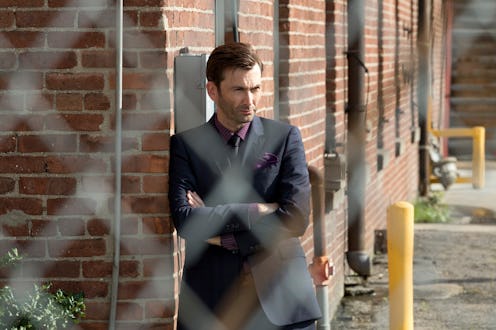
Season 1 of Jessica Jones ended in a bang — or more accurately, a very loud crack — when Jessica snapped the neck of Kilgrave, her rapist and psychological jailer. For as much as he deserved that end, the villain unquestionably made for good TV. So it was great if confusing news to learn that David Tennant would return for Jessica Jones Season 2. Fans have spent the last two years speculating about how that would occur, and it's certainly not unheard of for a comic book character to come back from the dead. However it would happen, one thing was always for sure about Kilgrave's reappearance: it would absolutely undo Jessica Jones.
Massive spoilers ahead for Jessica Jones Season 2, Episodes 1-11.
Someone in Jessica's life does metaphorically come back from the dead in Season 2. Janet McTeer's unnamed character is revealed in Episode 6 to be Jessica's mother Alisa, presumed dead after the car crash that did — we're assured — kill the rest of her family. Her life was saved by Drs. Leslie Hansen and Karl Malus, who are pioneering some radical genetic therapy. Her face burned off in the crash, the cell treatment she received rebuilt it differently, which explains why Jessica didn't recognize her.
The treatments gave Alisa super strength and some very serious anger issues — like Jessica's rage episodes, but much, much worse. (She kills Hansen and an IGH nurse in one of her fugue states.) After they're reunited, Jessica does her best to help her mom, but Pryce Cheng tries to assassinate her, leading to the cops arriving at Jessica's door. Alisa's new lawyer, Jeri, and Jessica encourage her to take a deal by giving up the whereabouts of Karl, who became her partner in the years after she woke up from her coma. But Alisa is tortured in prison by a sadistic guard named Dale, who Jessica learns has a habit of "hunting" prisoners and collecting trophies after their deaths — ruled suicides, but really murder.
When she goes to confront him, the guard attacks her and Jessica kills him. She's already dealing with the existential trauma of killing Kilgrave, and this death almost incapacitates her, though Dale was undoubtedly guilty. Crying and shaking in fear, Jessica starts to hear Kilgrave's voice along with her own inner monologue. He reminds her that she's done this before, and she knows what to do. He prompts her to get up and clean up, staging Dale's death as a suicide too.
Quickly after, a visual of Kilgrave manifests, dressed in his signature purple. He follows Jessica around, taunting her about her killer instinct and trying to make her believe that she's just as bad as him. He's every bad memory she has, including the memory of Trish's ill-conceived pop single, "Cray Cray." (I wonder if she ever got that VMA?) But Jessica proved once before that she was stronger than his suggestion, as close to her heart as his encouragements may hit. Close to the end of Episode 11, he observes, "I felt you shudder when you were so close. You wanted it, and that terrifies you."
And with that, he unknowingly fortifies Jessica. Killing never seemed to terrify him. He had no remorse and none of the regret that's been haunting Jessica all episode.
"It should," Jessica answers. "Because I'm not a killer. I'm not you. I'm not my mother. I can control myself. Which means I'm more powerful than you ever were."
Strangely, Kilgrave seems satisfied by her answer. "I'll be around if you need me," he says evenly — almost helpfully. And then he's gone.
So are these her memories of Kilgrave, or were his suggestions so powerful that they are literally out-living him? It's not clear in Jessica Jones Season 2, and it really doesn't matter. Because Jessica is and has always been a stronger, more principled person than Kilgrave. And finally, his ghost may be able to accept that.
If you or someone you know has been sexually assaulted, call the National Sexual Assault Telephone Hotline at 800-656-HOPE (4673) or visit online.rainn.org.